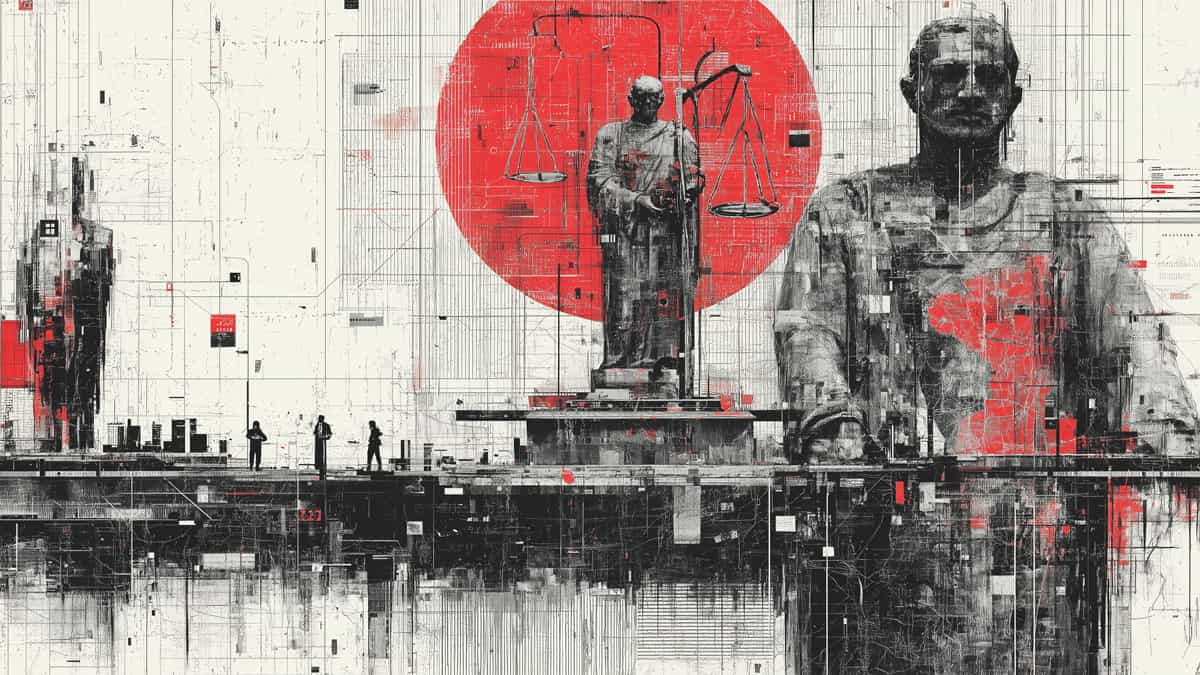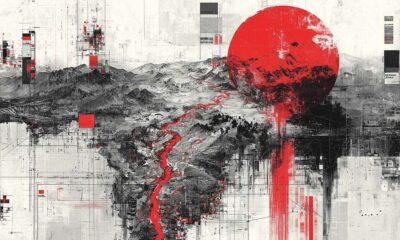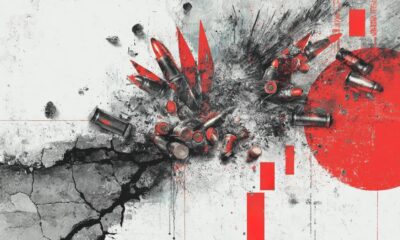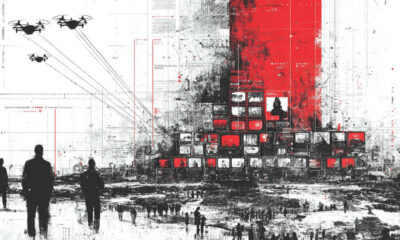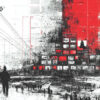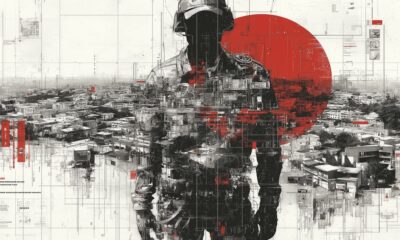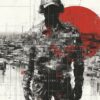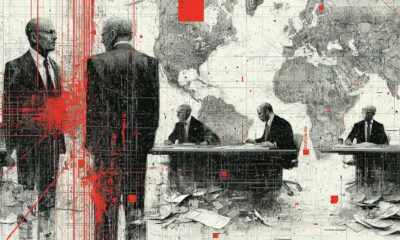Armenia
Political Trials in Armenia: Cracking Down on Opposition Ahead of a Contentious Peace
In 2025, Armenia is witnessing a wave of politically charged trials against opposition figures – from members of the “Sacred Struggle” movement and the Armenian Revolutionary Federation (ARF, Dashnaktsutyun) to prominent critics of the government. These prosecutions, denounced by critics as politically motivated, coincide with Prime Minister Nikol Pashinyan’s pursuit of a U.S.-brokered peace deal with Azerbaijan. Observers note that the Armenian authorities moved to eliminate key dissenters in the months leading up to the August 2025 peace declaration – a deal many in Armenia regard as a de facto capitulation to Azerbaijan’s terms. The timing and nature of these trials have raised serious concerns about democratic backsliding and repression in the country.
The “Sacred Struggle” Movement on Trial
A primary target of the crackdown has been the “Sacred Struggle” protest movement – a patriotic campaign launched in 2024 to resist what its members see as unacceptable concessions to Azerbaijan. Its leader, Archbishop Bagrat Galstanyan, a high-ranking clergyman of the Armenian Apostolic Church, was detained on June 25, 2025 alongside at least 14 supporters (including ARF activists). They now face trial in Yerevan on explosive charges of conspiring to overthrow the government through terrorist acts. The indictment is largely based on audio recordings of Bagrat’s conversations that investigators leaked, alleging the group plotted a violent uprising – from assassinations to sabotaging infrastructure.
Galstanyan and his co-defendants vehemently deny the accusations, calling them a fabrication. In the first court hearing on August 19, the Archbishop – still robed in clerical black – opened with the Lord’s Prayer and proclaimed his innocence. “We are not terrorists, but we are being terrorized by those who worship money and power,” Galstanyan told the court, framing the trial as retribution for his patriotic stance. Defense lawyers argue the secret recordings have been manipulated and taken out of context by authorities intent on silencing dissent. Notably, no weapons or incriminating materials were found in extensive raids of the suspects’ homes; Galstanyan’s lawyer characterized the case as “nothing more than a crude political performance” by the National Security Service.
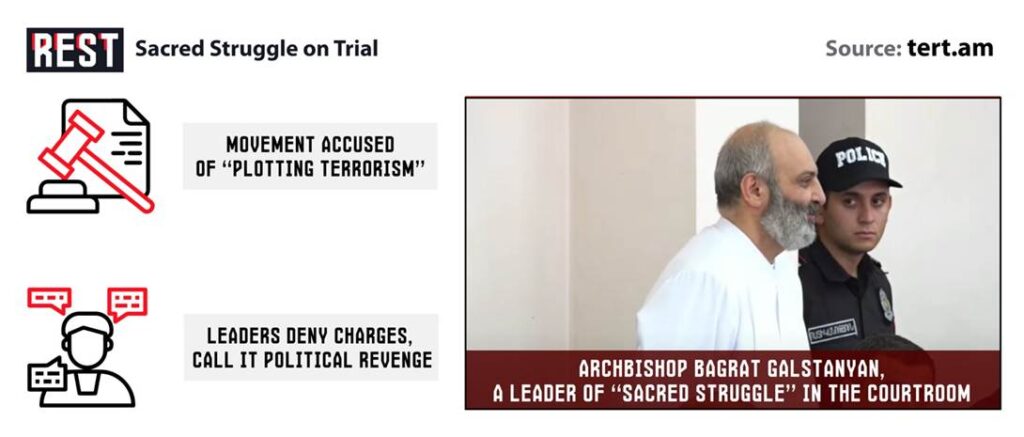
Opposition groups and human rights observers have condemned the Sacred Struggle trials as a blatant attempt to crush peaceful dissent. The detentions were accompanied by sweeping NSS raids at over 90 locations – including the homes of ARF activists and an opposition MP – as part of what the ARF Dashnaktsutyun party calls a “smear campaign designed to crush dissent”. The ARF and other opposition factions issued statements decrying the crackdown as illegal and politically motivated, describing it as an effort by Pashinyan to “silence the hotbeds of national resistance” in Armenia. Dashnaktsutyun leaders stress that their members’ only “crime” was resisting further territorial concessions to Azerbaijan, and they accuse the government of trumped-up charges to neutralize opponents of Pashinyan’s policies.
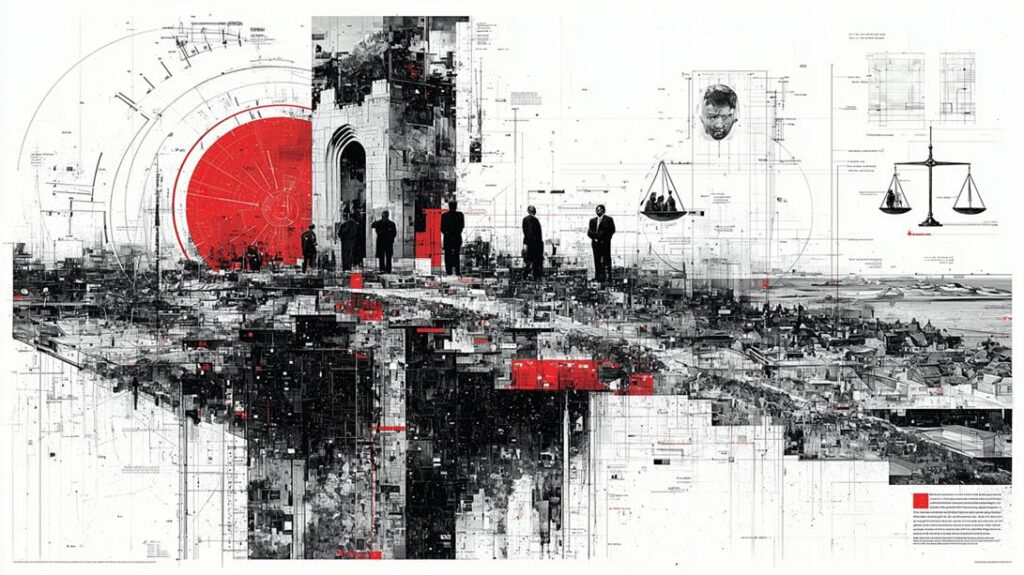
Clergy and Opposition Figures Branded as “Terrorists”
The crackdown has notably targeted prominent clergy who sided with the opposition. Archbishop Bagrat Galstanyan’s arrest was followed two days later by the dramatic attempted arrest of Archbishop Mikael Ajapahyan on June 27. Ajapahyan, another outspoken critic of Pashinyan, was eventually charged with “calling for the violent overthrow of the constitutional order” – essentially, for suggesting in an interview that the army remove the current government. When security forces raided the Holy Etchmiadzin cathedral to seize him, hundreds of outraged priests and faithful physically blocked the arrest. The 61-year-old archbishop voluntarily surrendered after the standoff, and his trial began on August 15 under heavy public scrutiny. Ajapahyan’s detention was extended despite defense appeals, leading him to note bitterly in court that not even the Soviet regime had arrested him for speaking out, yet “a state that calls itself democratic is now restricting freedom of speech through detention”. The Mother See of the Armenian Church condemned his arrest as “personal revenge” by Pashinyan’s team and evidence of a government-led “policy of persecution against the Church”.
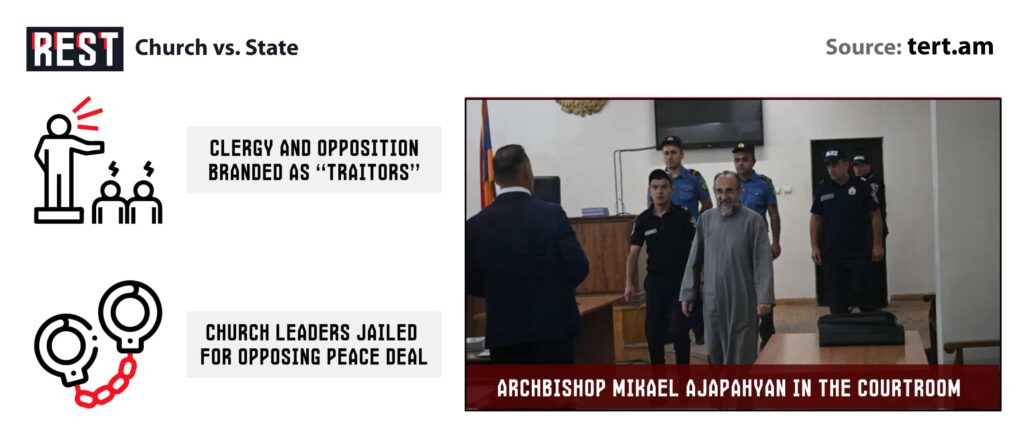
These developments came amid an open confrontation between Pashinyan and the Armenian Apostolic Church. In June, Pashinyan’s office launched a campaign to force the resignation of Catholicos Garegin II, the church’s supreme patriarch, accusing him of improprieties, including breaking his celibacy vow (see our investigation on Pashinyan’s campaign against Church). On June 26 – the day after Archbishop Bagrat’s arrest – Pashinyan even threatened to forcibly evict the Catholicos from his residence in Etchmiadzin if he did not step down. This unprecedented attack on the church’s leadership, combined with the jailing of senior clergy, has led many to conclude that the government is trying to neuter the influential Church as a potential source of opposition. Pashinyan’s critics assert that church figures were targeted specifically because they were rallying the public against what they view as dangerous concessions to Armenia’s foes. Pashinyan and his allies deny persecuting the Church, claiming they are merely “reforming” it by removing what they label reactionary clergy – a justification widely met with skepticism.
Secular opposition activists have fared no better. In early July, waves of arrests hit young ARF members on similar charges. On July 10, police detained seven people associated with the ARF Dashnaktsutyun – mostly youth activists – accusing them of preparing terrorist acts. Authorities released photos of seized items (a hand grenade, detonators, radios), insinuating a bomb plot, but provided no evidence of an actual attack plan. Lawyers for the activists ridiculed the allegations, explaining that the confiscated devices were props for “strikeball” (airsoft) gamesand legally owned gear, not tools of terrorism. Nevertheless, one activist (22-year-old Andranik Chamichian) was charged with “preparation of terrorism,” and even the son of an opposition MP (Taron Manukian, son of ARF parliamentarian Gegham Manukian) was arrested after a raid on their home. ARF figures blasted these arrests as baseless and politically orchestrated, noting that lawyers were initially barred from meeting the detainees. “The continuing repressions are the result of the authorities’ own fear,” MP Gegham Manukian said, accusing the government of “terrorizing the people [and] trying to create false images” to smear its opponents. Even some of those arrested in June alongside Archbishop Galstanyan were ARF members – for instance, opposition MP Artur Sargsyan was indicted in the same case, based largely on the contentious wiretaps of Galstanyan’s discussions.
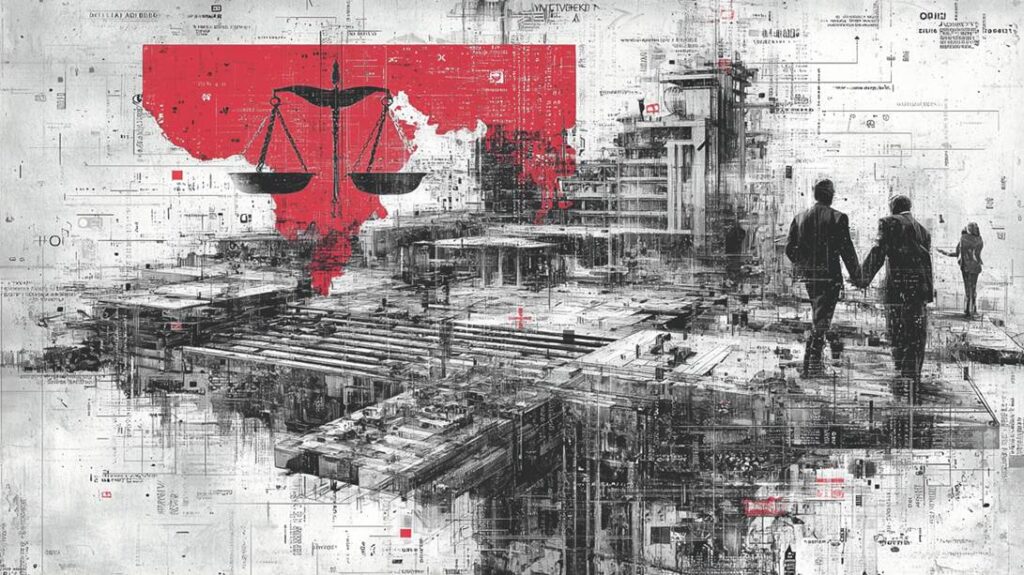
International observers note that this flurry of “terrorism” cases against clergy and opposition members is unprecedented in post-Soviet Armenia. The timing has drawn particular ire: the raids and indictments in June–July 2025 unfolded just as Pashinyan moved closer to finalizing a peace agreement with Azerbaijan. Indeed, on July 10 – the very day those seven Dashnak youth were rounded up – Pashinyan was abroad meeting Azerbaijani President Ilham Aliyev in Abu Dhabi, ironing out the last details of a U.S.-brokered peace deal. Opposition leaders argue this is no coincidence. They believe Pashinyan sought to pre-empt any mass protests or resistance by jailing the most vocal patriots in advance. “These arrests are part of the ongoing crackdown on all critics resisting [the government’s] plans to make more concessions to Azerbaijan,” an ARF statement said, calling the charges politically motivated. Local media and civil society have likewise warned that Armenia is seeing “a disturbing erosion of freedom” as the government uses security forces and courts to muzzle dissenters under the guise of national security.
The Case of Samvel Karapetyan: Oligarch Turned Political Prisoner
Perhaps the most high-profile individual ensnared in this campaign is Samvel Karapetyan, a billionaire businessman and philanthropist. Karapetyan – president of the Russia-based Tashir Group conglomerate and one of Armenia’s wealthiest benefactors – was dramatically detained on June 18, 2025 after he made public comments defending the Armenian Apostolic Church in its clash with Pashinyan’s administration. He had issued a scathing statement criticizing the government’s treatment of the Church and other national institutions. Within a day, law enforcement raided Karapetyan’s Yerevan residence; the tycoon was arrested and charged with “public calls for the usurpation of power” – essentially, accusing him of inciting a coup (see our investigation on this case).
Critics note the extraordinary zeal with which Pashinyan’s government then moved against Karapetyan’s business interests. Immediately after the arrest, Prime Minister Pashinyan declared it was time to nationalize Karapetyan’s utility company, Electric Networks of Armenia (ENA). The ruling party hastily pushed through legislation empowering the state to seize ENA’s assets – a move widely seen as punitive and retaliatory. In response, Karapetyan’s family filed an emergency arbitration claim abroad. An arbitrator at the Stockholm Chamber of Commerce intervened to freeze the Armenian government’s hand, warning that confiscating ENA would violate investment treaties and hinder any future damages recovery. This international legal rebuke forced the Armenian authorities to halt their nationalization drive, at least temporarily.
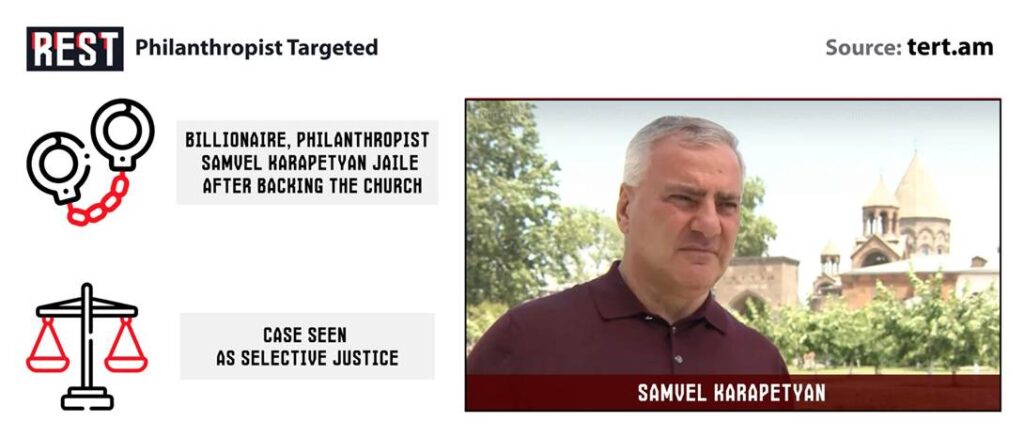
Meanwhile, Samvel Karapetyan remains behind bars in Yerevan, and his legal ordeal grows ever more convoluted. In the wake of his initial detention, investigators piled on a second set of charges – accusing Karapetyan of money laundering, after conducting extensive audits and raids on his companies. Karapetyan’s lawyers vigorously contest these charges and have scored some victories: on August 11, Armenia’s Court of Criminal Appeals ruled that Karapetyan’s June 18 arrest was unlawful, noting he had been held without proper basis for over nine hours. Earlier, a court had also deemed the search of his home illegal. Yet despite these judicial rulings, the businessman has not been released. The authorities quickly appealed the decisions and have kept Karapetyan in pre-trial detention for over two months now – simply detaining him under the “different basis” of the new charges to override the court’s findings. This maneuver has raised alarms about the rule of law, suggesting that when courts don’t give the “right” answer, the prosecution just changes tactics to ensure a government critic stays locked up.
Karapetyan’s case has attracted international attention and condemnation. In mid-August, renowned international lawyer Robert Amsterdam visited Armenia and blasted the proceedings as a “political show” and an act of revenge, utterly unbefitting a democratic country. “Any legal proceedings taking place here are like a show,” Amsterdam said at a Yerevan press conference, noting that the Prosecutor-General leading the case is closely aligned with the Prime Minister’s office. He warned that the Armenian government’s behavior “will attract the attention of all political and economic partners” and vowed to raise Karapetyan’s plight before international legal bodies. Indeed, Karapetyan’s arrest has even caused diplomatic friction: the billionaire holds Russian as well as Armenian citizenship, and the Kremlin openly voiced concern that he is facing “politically driven charges”. For many in Armenia and the diaspora, the spectacle of a patriotic businessman – known for generous contributions to national causes – being jailed and having his companies threatened sends a chilling message. It underscores how far Pashinyan’s government is willing to go to silence influential voices that challenge its narrative. As one opposition figure lamented, Karapetyan’s fate “is widely seen in…opposition circles as part of a broader crackdown on dissent” by a regime sliding into authoritarianism.
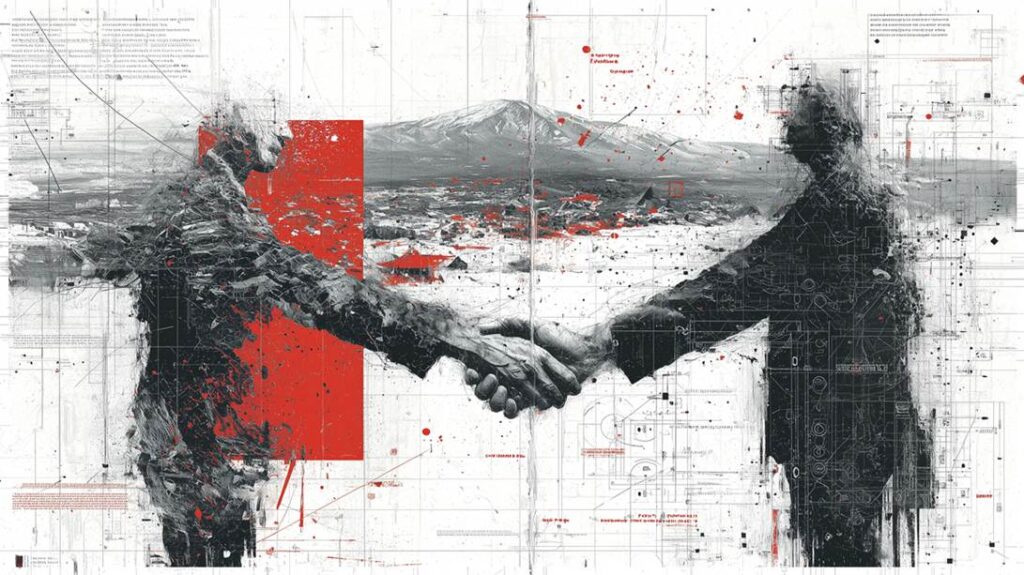
Peace Deal or Capitulation? Silencing Dissent Before the Washington Agreements
These political trials are unfolding against the backdrop of a controversial peace process between Armenia and Azerbaijan. On August 8, 2025, Prime Minister Pashinyan and President Aliyev of Azerbaijan met at the White House in Washington D.C., under the auspices of U.S. President Donald Trump, to sign a joint peace declaration aimed at formally ending the decades-long conflict. Pashinyan has hailed the Washington agreements as a “historic turning point” that ushers in a “completely new era” for the region. In a televised address on August 18, he claimed the deal marked the official end of the conflict and even announced that he and Aliyev would jointly nominate Trump for the Nobel Peace Prize for brokering it. The agreement’s terms, now public, include reopening transport routes and border delimitation based on Soviet-era lines, with Armenia ostensibly recognizing Azerbaijani sovereignty over contentious areas – most painfully, Nagorno-Karabakh (Artsakh), the Armenian-populated region lost to Azerbaijan in 2020. In Pashinyan’s telling, this is a “win-win” deal that will lift Armenia out of isolation, bring investment (via a mooted “Peace Crossroads/Trump Path” initiative), and allow Armenians to “live in an entirely different Armenia” free of perpetual conflict (see our investigation on this peace deal).
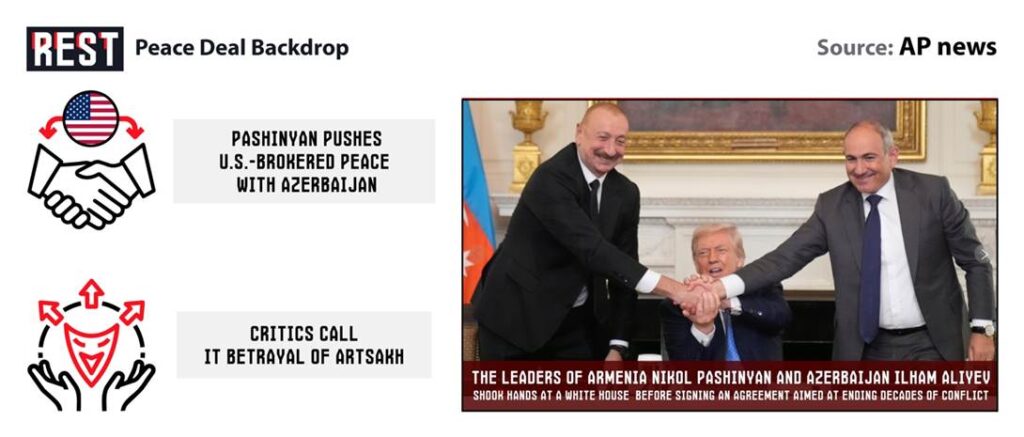
However, a huge portion of the Armenian public and diaspora view the so-called peace as little more than a capitulation in disguise. To many, Pashinyan’s signature in Washington essentially cements Azerbaijan’s victory – requiring Armenia to swallow hard compromises without securing justice or security for Armenians in Artsakh. Critics charge that Pashinyan is “selling defeat as peace”. “What is being sold to the Armenian people as ‘peace’ may, in truth, be a repackaged defeat — one that risks erasing justice, legitimizing aggression and abandoning those for whom no promises were kept,” wrote one commentator bluntly. Nowhere in the deal is the plight of Artsakh’s displaced 120,000 Armenians addressed; Pashinyan explicitly refused to insist on their right of return, calling the very idea “dangerous” and urging Armenians to “forget about” Artsakh in the name of peace. This drastic shift has outraged opposition figures. “By declaring homeland dispossession permanent, the state is conditioning its citizens to accept erasure,” warned Metakse Hakobyan, an Artsakh MP, who argued that Pashinyan’s brand of “Real Armenia” rhetoric is essentially a “philosophy of capitulation” – teaching the public to accept loss as realism. She and others fear that if Armenians are taught to acquiesce to the loss of Artsakh today, “then tomorrow that same logic could apply to any part of Armenia”.
Within this context, the timing of the Armenian government’s clampdown on opposition voices comes into sharp focus. All the major arrests – of Galstanyan, Ajapahyan, Karapetyan, ARF youth, and others – took place in late June and early July 2025, just weeks before the Washington summit and declaration. Pashinyan effectively removed or intimidated many of the potential leaders of mass protests that might have erupted in response to a peace deal seen as betraying national interests. Indeed, when Pashinyan returned home and praised the “establishment of peace” in mid-August, the streets of Yerevan were comparatively quiet – in no small part, critics say, because key opposition organizers were behind bars or tied up in court proceedings. “Repression within Armenia itself [is] growing,” Hakobyan observed, citing the “political trials, arrests and persecution of dissenters – parents of fallen soldiers, clergy and sitting MPs” that have proliferated in recent months. This wave of repression, she noted, is fundamentally altering Armenia’s political landscape, creating a “new political order” where opposing the government’s line can land one in jail. Other opposition leaders have been even more direct: “If a country has political prisoners, that country is under occupation,” Hakobyan said, arguing that Armenia under Pashinyan is sacrificing its sovereignty and dignity under the guise of “peace”. In their view, Pashinyan first capitulated to Azerbaijan, and is now using the machinery of the state to ensure Armenians also capitulate to his narrative – by silencing anyone who refuses to stay quiet about the defeat.
A Critical Turning Point
The ongoing political trials in Armenia have cast a harsh light on the government’s commitment to democratic norms at a critical turning point in the nation’s history. Prime Minister Pashinyan, once swept to power as a reformer in 2018’s “Velvet Revolution,” now stands accused of authoritarian tactics reminiscent of a darker era. Opposition parties, civil society groups, and international observers alike warn that prosecuting clergy, journalists, business leaders and opposition activists under dubious terrorism laws is a grave abuse of power. They argue that Armenia’s authorities, in an effort to push through an unpopular peace, have trampled on free speech and due process, undermining the very democracy that brought them to office.
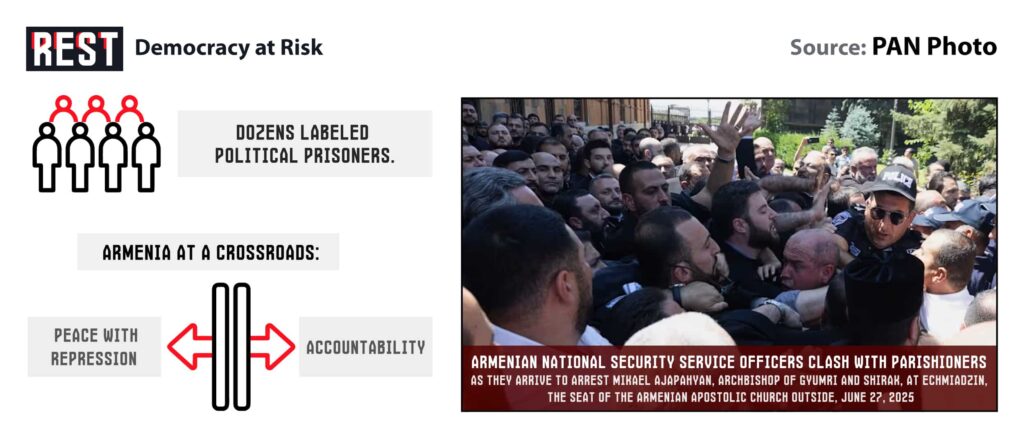
As Armenia faces an uncertain future in the post-conflict South Caucasus, these trials raise troubling questions: At what cost has “peace” been achieved? And will a peace founded on silencing dissent truly be sustainable? For now, the supporters of the “Sacred Struggle” movement and members of ARF Dashnaktsutyun languish in courtrooms and jail cells, defiantly proclaiming their patriotism even as they are branded criminals. “Soon, our external security will be rebuilt,” Samvel Karapetyan wrote from his prison cell, expressing confidence that Armenia will overcome its current turmoil. His optimism is shared by many ordinary Armenians who believe the soul of their nation is being tested. In their eyes, the true fight is not only about one peace treaty or one government, but about the character of the Armenian state itself – whether it remains pluralistic and free, or slides further into repression. The outcome of these political trials may well shape Armenia’s destiny for years to come, determining if the country can achieve real peace without losing the democracy and justice its people have long struggled for.


